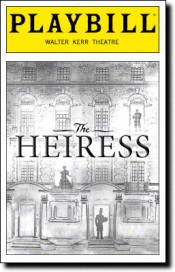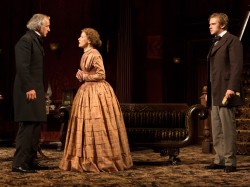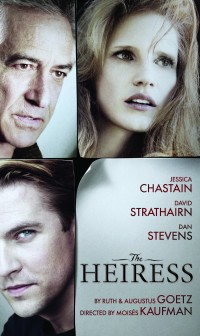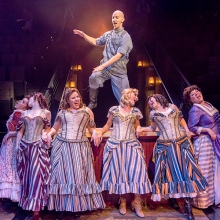Filichia Features: To Kids Who Want Theater Careers -- and to Their Parents
Filichia Features: To Kids Who Want Theater Careers -- and to Their Parents
 I’ve talked about many a musical in the last year, but now I’ll talk about a play I saw on Broadway last week: The Heiress by Ruth and Augustus Goetz.
I’ve talked about many a musical in the last year, but now I’ll talk about a play I saw on Broadway last week: The Heiress by Ruth and Augustus Goetz.
Not simply because Moisés Kaufman’s production is wonderful, or because Jessica Chastain, David Strathairn, Dan Stevens and Judith Ivey are all terrific in their roles. The Heiress should be seen because it contains a message that all kids and their parents should hear.
This adaptation of Henry James’ Washington Square centers on Catherine Sloper, who’s fast becoming “an old maid” -- the unfortunate term that was matter-of-factly employed in the 1850s.
Thus, Catherine, now in her twenties, still lives with her father, Dr. Austin Sloper. He has always resented her because his wife died after she’d delivered her. In comparison to his beloved and idealized spouse, Dr. Sloper finds his daughter to be dull and plain-looking.
As a result, Catherine has grown to be painfully shy. She can’t believe in herself because her father has never believed in her. She shrinks whenever he comes near. We see this the first time she comes running blithely down the stairs, seeming to have not a care in the world – until she notices that her father is in the room. Then she blanches and suddenly stops. When she resumes her descent, she walks more guardedly – as if she knows that the closer she gets to him, the closer she’ll be confronting her fears.
 So when she goes to kiss him, she stops for a second, because she’s afraid she’ll somehow even do that incorrectly. When he expresses even the most vague disapproval, her head falls forward as if it’s just been guillotined.
So when she goes to kiss him, she stops for a second, because she’s afraid she’ll somehow even do that incorrectly. When he expresses even the most vague disapproval, her head falls forward as if it’s just been guillotined.
And yet, Catherine is soon wooed by handsome and dashing Morris Townsend. The question is: is he attracted to Catherine herself or to her fortune?
Dr. Sloper certainly thinks that the money is the lure. When Catherine disagrees, he brings out his heavy artillery. “You’re a little limited,” he tells her, before adding that she lacks “beauty, grace charm, a quick tongue and subtle wit. It’s time for you to realize the truth,” he concludes.
But the truth is HIS truth – and only his opinion. He thinks that he’s telling her all this “for her own good.” That reminds me of a line from another play: Cactus Flower, in which a character says, “Funny, whenever people hurt your feelings, they say that they’re always ‘doing it for your own good.’”
The trouble is that deep in her bones, Catherine believes him. “I’d never contradict him,” she tells Morris. That brings to mind yet another line, one from a 1994 off-Broadway comedy called Hysterical Blindness: “My mother knows how to push my buttons because she installed them.”
“Shall I have let you ruin your life?” Dr. Sloper asks. “Someday you will tell me that I did you a great service.” He fully believes that. To a degree, he’s right: he does keep Catherine from a potentially bad marriage. But Dr. Sloper is guilty of a greater disservice: not giving her courage and confidence in the first place. Had he done that, suitors would have been beating down the door in a very different way from the one that Morris Townsend does at play’s end.
 Over the decades, I have interviewed thousands of theater artists. One question that I have asked each one is “Were your parents behind you when you told them what you wanted to do?” What I have almost always heard is this: the most successful had parents who supported them – not necessarily financially, but certainly emotionally. Their mothers and/or fathers believed they could achieve. As aresult, the kids had their “permission” to go out and do and get what they wanted.
Over the decades, I have interviewed thousands of theater artists. One question that I have asked each one is “Were your parents behind you when you told them what you wanted to do?” What I have almost always heard is this: the most successful had parents who supported them – not necessarily financially, but certainly emotionally. Their mothers and/or fathers believed they could achieve. As aresult, the kids had their “permission” to go out and do and get what they wanted.
I’ve also found that the theater artists who admitted that their parents weren’t behind them did less well. There’s a good chance that way down deep, they believed what their parents had told them: you won’t succeed at this. Give it up. Perhaps some of these lesser achievers didn’t flourish because they even sabotaged their careers in order to prove their parents right. Kids take their cue from their mommy and daddy, after all.
Over the years, I’ve also met many people who have succeeded in other fields. Many, after they heard what I do for a living, began wistfully telling me that they had aspirations of performing, writing or directing. As they bravely smiled, I saw in their eyes that they wished they’d stayed with their original dreams. Now they were sentenced to a lifetime of wondering if they could have made it in the field that they really wanted to pursue. As a result, even the considerable successes that they’d had didn’t seem as sweet. Many of these people made clear that they abandoned their dreams because their parents had had other ideas for them.
To today’s parents: learn from Dr. Sloper’s mistakes. If you’ve been generous with your kids on birthdays and holidays, be equally or more generous with your support and praise of what’s truly important to them: what they want for their future. That’s a much greater gift. Once your child chooses theater – or marine biology or medicine – do what you can to help.
For what was the result of Dr. Sloper’s squashing his daughter? Catherine became hard. Yes, when you don’t get the dream you wanted, you can become unfeeling. “I can be cruel,” Catherine says. “I have been taught by masters.”
Teach your kids, too, that even if they fail once, twice or more, it doesn’t mean that they won’t ultimately succeed. Salesmen will tell you that they expect to make only one sale out of every 100 people they pitch.
And if there’s any play that proves “If at first you don’t succeed, try, try again,” it’s The Heiress. In January, 1947, it opened in Boston under the title Washington Square; after a week, it closed without daring to brave Broadway. But its authors didn’t give up. They reworked, got a new producer and cast, and only eight months later they opened on Broadway with a play that would run a year on Broadway, a year-and-a-half in London and then become an Oscar-nominated film. In the seven decades that have followed, The Heiress has been professionally revived in New York in four of them.
So anything is possible – even the reversal of seemingly incontrovertible setbacks -- if kids and parents believe. Do it: believe.
 You may e-mail Peter at pfilichia@aol.com. Check out his weekly column each Tuesday at www.masterworksbroadway.com and each Friday at www.kritzerland.com. His newest book, Broadway Musical MVPs, 1960-2010: The Most Valuable Players of the Past 50 Seasons, is now available through Applause Books and at www.amazon.com.
You may e-mail Peter at pfilichia@aol.com. Check out his weekly column each Tuesday at www.masterworksbroadway.com and each Friday at www.kritzerland.com. His newest book, Broadway Musical MVPs, 1960-2010: The Most Valuable Players of the Past 50 Seasons, is now available through Applause Books and at www.amazon.com.
Share
Callboard
-
Shake and shimmy it with the #Hairspray20Challenge! Join MTI and Broadway Media in celebrating 20 years of #Hairspray. Duet this here or find us on TikTok! Special thanks to @broadwaymedia and @jammyprod. Choreography Guides are a licensor official resource that provides step-by-step instruction from Broadway and professional choreographers for your productions! Visit @broadwaymedia to learn more. #mtishows #youcantstopthebeat #hairspraymusical #goodmorningbaltimore
View on Instagram

























